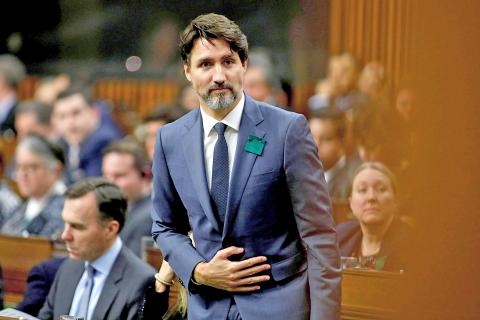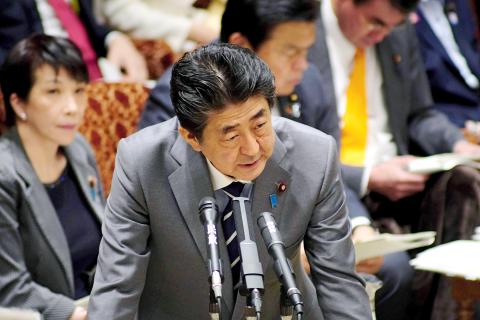President Tsai Ing-wen (蔡英文) yesterday thanked Canadian Prime Minister Justin Trudeau and Japanese Prime Minister Shinzo Abe for their support of Taiwan’s bid to join the WHO as the number of confirmed 2019 novel coronavirus cases in the nation increased to nine.
“Particularly, I want to thank the US, Canada, Japan and other countries for publicly supporting Taiwan’s bid to join the WHO, as well as other international friends who have recently voiced support for Taiwan’s inclusion in the WHO,” Tsai said at the Presidential Office in Taipei as she reassured people about the government’s ability to prevent an epidemic.
“Taiwan is capable of and responsible for making contributions to the world. The WHO must not exclude Taiwan due to political factors,” she said.

Photo: Reuters
Trudeau, after circumventing a question by Canadian Conservative Party leader Andrew Scheer about Taiwan’s inclusion in the WHO in parliament on Tuesday, became assertive when answering the same question from lawmaker Michael Cooper on Wednesday.
“This is a question about Taiwan,” Cooper said, stressing Taiwan by spelling it out. “Does the government support the inclusion of Taiwan in international discussion about the virus? Again, Taiwan, yes or no?”
“Yes, Mr Speaker. As we did during the time of the SARS virus, we support Taiwan’s meaningful participation in international multilateral forums. Especially when its presence provides important contributions to the global public good. We believe that Taiwan’s role as an observer in World Health Assembly meetings is in the best interest of the international health community and it also is an important partner in the fight against this epidemic,” Trudeau said.

Photo: AFP
His remarks were greeted by applause.
It was the first time that a Canadian prime minister had publicly voiced support for Taiwan’s bid to join the WHO, following similar gestures by Canadian Deputy Prime Minister Chrystia Freeland and former Canadian minister of health Ginette Petitpas Taylor, the Ministry of Foreign Affairs said in a statement.
Separately yesterday, Abe told the Japanese parliament that Taiwan’s participation in the WHO is necessary to effectively combat the spread of the novel coronavirus, Kyodo news reported.
“It will be difficult to maintain health and prevent further infections in this region if [Taiwan] is excluded for political reasons,” Abe was cited as saying. “We will continue to make our country’s stance clear at the WHO.”
On Wednesday, Saint Lucian Prime Minister Allen Chastanet issued a statement calling on the WHO to include Taiwan.
“Given Taiwan’s proximity, its importance as a transport hub and its 23 million population, Saint Lucia urgently calls on the WHO ... to ensure that there is full involvement of the Taiwanese authorities in the international consultations, planning and decisionmaking to monitor, control and ultimately halt the further spread of the coronavirus,” the statement said.

CHAOS: Iranians took to the streets playing celebratory music after reports of Khamenei’s death on Saturday, while mourners also gathered in Tehran yesterday Iranian Supreme Leader Ayatollah Ali Khamenei was killed in a major attack on Iran launched by Israel and the US, throwing the future of the Islamic republic into doubt and raising the risk of regional instability. Iranian state television and the state-run IRNA news agency announced the 86-year-old’s death early yesterday. US President Donald Trump said it gave Iranians their “greatest chance” to “take back” their country. The announcements came after a joint US and Israeli aerial bombardment that targeted Iranian military and governmental sites. Trump said the “heavy and pinpoint bombing” would continue through the week or as long

TRUST: The KMT said it respected the US’ timing and considerations, and hoped it would continue to honor its commitments to helping Taiwan bolster its defenses and deterrence US President Donald Trump is delaying a multibillion-dollar arms sale to Taiwan to ensure his visit to Beijing is successful, a New York Times report said. The weapons sales package has stalled in the US Department of State, the report said, citing US officials it did not identify. The White House has told agencies not to push forward ahead of Trump’s meeting with Chinese President Xi Jinping (習近平), it said. The two last month held a phone call to discuss trade and geopolitical flashpoints ahead of the summit. Xi raised the Taiwan issue and urged the US to handle arms sales to

BIG SPENDERS: Foreign investors bought the most Taiwan equities since 2005, signaling confidence that an AI boom would continue to benefit chipmakers Taiwan Semiconductor Manufacturing Co’s (TSMC, 台積電) market capitalization swelled to US$2 trillion for the first time following a 4.25 percent rally in its American depositary receipts (ADR) overnight, putting the world’s biggest contract chipmaker sixth on the list of the world’s biggest companies by market capitalization, just behind Amazon.com Inc. The site CompaniesMarketcap.com ranked TSMC ahead of Saudi Aramco and Meta Platforms Inc. The Taiwanese company’s ADRs on Tuesday surged to US$385.75 on the New York Stock Exchange, as strong demand for artificial intelligence (AI) applications led to chip supply constraints and boost revenue growth to record-breaking levels. Each TSMC ADR represents

State-run CPC Corp, Taiwan (CPC, 台灣中油) yesterday said that it had confirmed on Saturday night with its liquefied natural gas (LNG) and crude oil suppliers that shipments are proceeding as scheduled and that domestic supplies remain unaffected. The CPC yesterday announced the gasoline and diesel prices will rise by NT$0.2 and NT$0.4 per liter, respectively, starting Monday, citing Middle East tensions and blizzards in the eastern United States. CPC also iterated it has been reducing the proportion of crude oil imports from the Middle East and diversifying its supply sources in the past few years in response to geopolitical risks, expanding